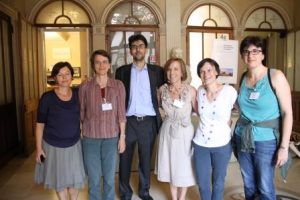The project consortium consists of 3 partners from different EU countries: Italy, Spain and Belgium.
CeRP-Collegio Carlo Alberto (leading partner)
Founded in 1999 as a joint project of the University of Turin and the Compagnia di San Paolo (an Italian foundation), CeRP is the first research center in Italy (and one of the first in Europe) with a specific focus on households’ savings, pension economics, population aging and financial literacy. Since September 2006 the Center is affiliated, as a research unit, to the Collegio Carlo Alberto, a research hub for Economics and Social Sciences.
The mission of CeRP is to investigate the consequences of population aging, with an emphasis on factors affecting savings for old age, retirement and, in general, the welfare of the elderly. Theoretical and applied policy-oriented research play an approximately equal role in the activities of the center.
CeRP is (and has been since the beginning, except for the year and the half in which she served as Minister of Labor in the Monti Government) coordinated by Elsa Fornero, professor of Economics at the University of Turin, who was the initial creator of the Center. The Scientific Committee is composed of high standing academics from European universities and American research institutions. The staff includes junior and senior research fellows as well as visiting fellows from other institutions.
Research is conducted both at the micro and at the macro level, and a special attention is devoted to policy aspects. The center aims at being a reference point for all institutions dealing with pension issues, both under an economic and a financial perspective. Over the years CeRP has earned a solid international reputation, also thanks to its participation in European research networks and to its international annual conferences
CeRP assigns a primary role to the dissemination of the research output, through conferences, seminars, publications and contributions to the debate on pension issues. CeRP has published several volumes and produces a Working Paper Series.
The researchers involved in the project are Elsa Fornero (Senior Advisor), Flavia Coda Moscarola (project manager), Francesco Figari (project manager), Ainhoa Aparicio Fenoll, Giulia Dotti Sani, Matteo Luppi.
CPB-University of Antwerp
The Herman Deleeck Centre for Social Policy (CSB) has been studying social inequalities, poverty and the distributive capacities of welfare states for over 30 years. Founded by the late Herman Deleeck in 1972 it has become widely recognised as a centre of excellence for research on socio-economic questions and policies. The CSB’s work builds upon and strives to ameliorate the conceptual and theoretical foundations of comparative welfare state literature. The approach is multi-disciplinary (social and economic sciences) and predominantly empirical and quantitative. The CSB employs a wide range of techniques and methods and plays an active role in collecting new data and developing innovative tools of analysis.
The Centre has set up, or contributed to several important research infrastructures, including the CSB Minimum Income Protection Indicator Database (CSB-MIPI), the EU Reference Budgets Database, and the microsimulation models MEFISTO and EUROMOD. The CSB also played a key role in several other large-scale international projects on inequality and social policy involving institutions and researchers generally acknowledged to be at the top of their field, including the EU-funded Network of Excellence EQUALSOC, the Network for the Analysis of EU-SILC (Net-SILC 2 and Net-SILC 3) and EUROMOD Update projects funded by DG EMPL, as well as the EU Framework Programmes projects LoWER I, II, and III, AIM-AP, InGRID, GINI (partly coordinated by CSB) and ImPRovE (in a leading capacity), collaborative research projects funded by the Dutch Stichting Instituut GAK, and the European Commission-financed pilot project on the development of a common methodology on reference budgets in Europe.
The researchers involved in the project are Tim Goedemé and Gerlinde Verbist.
http://www.centrumvoorsociaalbeleid.be
Universidad de Alcalá
The Department of Economics at the University of Alcalá (UAH) has been conducting research on labour, welfare economics and on the distribution and redistribution of income and wealth since the 1980s. The current Department is a result of combination of scholars from two departments in the areas of Economic Theory, Sociology and Quantitative methods in Economics with widely recognized researchers working intensively on these topics. The Department currently includes highly competitive research groups working both on wellbeing, inequality, poverty and public policies (WEIPO) and on labour economic issues. WEIPO members have held a variety of national and international projects in recent years related to “Welfare State Sustainability and intra and intergenerational income mobility” (SIMBIEN), “Redistributive policies issues and microsimulation” (EUROMODUpdate), “Inequality, Poverty and Equality of Opportunity” (DEPOPOR) or Poverty, Inequality and Segregation: New Methods, New Evidence (PISE).
The researchers involved in the project are Olga Cantó, Elena Bárcena (U. of Malaga), Inmaculada Cebrián and Gloria Moreno, all of them members of WEIPO. The first two researchers also belong to EQUALITAS , a solid group of researchers working extensively in the analysis of wellbeing, inequality and poverty in a wide sense.
Department of Economics website: http://www.uah.es/en/conoce-la-uah/campus-centros-y-departamentos/departamentos/Economy/


